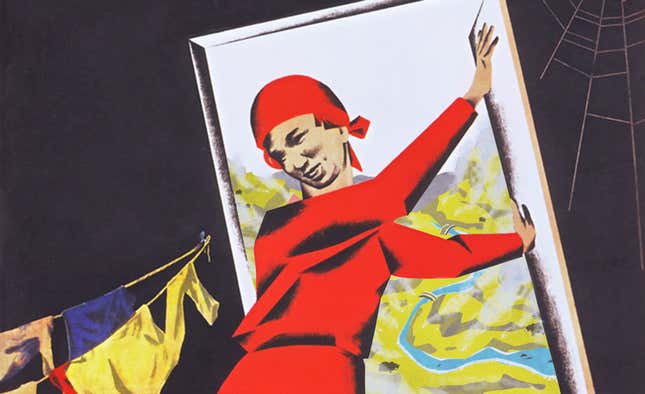Feminism at the End of the World
In Depth

Greetings from Russia’s Valley of the Geysers, one of the wonders of the world! This sliver at the edge of the globe is packed, as the name suggests, with nearly a hundred geysers. Plants grow fast enough that you can watch ferns unfurl. The ground steams so violently that I keep thinking, when I glance out my window, that the valley’s on fire.
There’s no Internet, and there are no roads. Instead, we scamper down wooden paths across multicolored waterfalls and boiling rivers. We bathe in a stone basin fed by geyser water. We watch for bears. When the weather’s bad, as it is ten months out of the year, we tuck ourselves into our cabins and watch movies. The two park rangers in residence suck on lemon rinds soaked in spirits to blur their monotonous days. For now, nobody lives here but the rangers, one volunteer, five construction workers, and me. I’m the only woman here. I’m the cook.
It’s hard to see the wonder of the valley out a ten-inch-tall kitchen window.
The territory’s administrators originally sent me here to vend souvenirs to the tourists who swing down each clear day by helicopter. The tourist groups follow a brief circuit along the paths, past bubbling mud and sulfurous water, then take off in a burst of air that sends everything not rooted flying up with them. When I flew in, Nikolai, the head ranger, met me with his arms crossed. “We don’t need someone to sell souvenirs,” he pointed out. “We only have tourists for a few hours each week.”
What they did need, he said, was a woman. “Your main task here is to keep me in a good mood,” he said. “Your secondary task is cooking.”
So I make sauces and soups and salads. I peel potatoes with a sharp knife. There’s no electric refrigeration, so I pack and unpack snow around our softening cuts of meat and cheese. The men compliment me over a tasty meal: “You’ll make a wonderful wife!” They discuss my future (as yet unknown to me) marriage. Konstantin and Dennis, the other ranger and the volunteer, come to the door of the kitchen and say, “Lady of the house, may we enter?”
“Come in,” I say. They do, carrying an extra bed frame between the two of them.
“Look at this,” Konstantin says. “Everything’s tidy and warm. Someone’s looked at this place with a feminine gaze.”
“She can cook, she can clean, she can light a fire,” Dennis says. “She’s ready to get married!” I go to move a bench out of their way. Dennis drops his end of the bed and leaps to my rescue. “That’s too heavy for you,” he tells me, and I know why he thinks so.
-

-

-

-

-

-

-

-

-

-

-

-

-

-

-

-

-

-

-

-

-

-

-

-

-

-

-

-

-

-

-

-

-

-

-

-

-

-

-

-








































